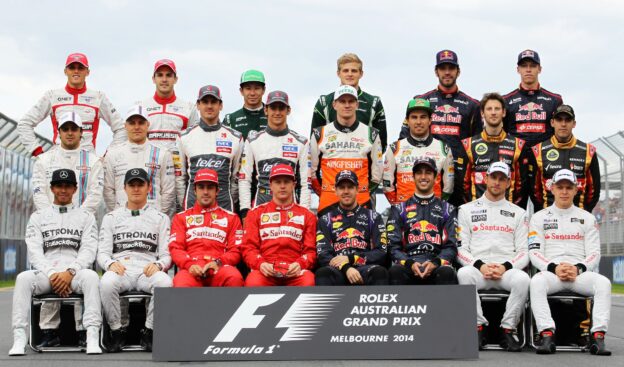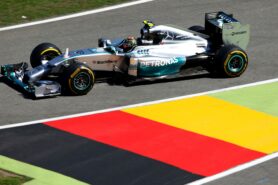What does it take to be an F1 driver?

The F1 World Championship is the pinnacle of motorsports. It’s where the world’s greatest drivers hop into the world’s fastest racing cars hoping that they will emerge to a champagne spraying reception, hordes of super models, lucrative sponsorship deals and worldwide fame. So what does it take to join the ‘world’s greatest driversclub’? Well for a start it takes nerves of steel. Not only do the cars hurtle round the track at speeds in excess of 300km/h but from 1952 to 1982 F1 saw at least one driver die every season. Overall 50 drivers have been killed in the F1 World Championship since the very first British Grand Prix at Silverstone in 1950.
The speed of the cars isn’t the only threat to the drivers, as well as potential car malfunctions and the danger of track debris, the human body isn’t particularly well adjusted for travelling at over 300km/h in an open top, lightweight cockpit. In an extreme example at the Canadian Grand Prix in 2007, Robert Kubica survived a high speed crash in which his body exposed to more than 28 times the acceleration of gravity. For that brief period his body would have gone from weighing 74 kilos to weighing 2 tonnes.
In a normal scenario F1 drivers subject their bodies to g-force that would render the average person unconscious within seconds, yet they can tolerate up 3-5g for sustained periods of a race. An F1 driver has to be fit and strong enough to be able to handle extreme pressure against their body and cope with the fact that these pressures on corners make it incredibly difficult to breathe. Without expert cardio-vascular training and strengthening of core, arms and neck muscles a driver wouldn’t be able to cope with the pressures that they are exposed to.
As if that wouldn’t be enough to cause a driver to black out, over a two-hour period they also have to contend with extreme heat (particularly when racing in hotter countries). The engines of an F1 car produces such tremendous heat that drivers can lose up to 4kg of their body weight in sweat during a single race. It’s well known that a person’s mental capacity is hugely reduced under extreme pressure, and heat plus extreme dehydration greatly effects concentration and causes mental lapses. Mental incapacitation of any sorts are not ideal for someone who is travelling at over 300km/h whilst trying to successfully navigate a complex circuit as well as showing tactical awareness in a race.
Preparing for an F1 race is like preparing for a marathon every couple of weeks but if it was just about physical training then most people could get themselves into the right shape and compete at the top. So what is it that sets the great drivers apart from the rest? Most people would assume that exceptionally fast reaction skills has to be top of any drivers list of attributes yet Michael Schumacher notoriously had average reaction times. Former team mate Eddie Irvine stated that: “My reaction time was faster than his. You might think that reactions would be a skill you’d need to be a top F1 driver but it’s a skill Michael does’t need because he doesn’t have it.”
If not lightning reactions, then does F1 greatness have something to do with bravery in the face of extreme danger? How else could you go out on track knowing that dozens had died doing what you were about to do? Yet Ayrton Senna, the most daring driver of them all, spoke openly about his anxieties around racing:
“Because I believe in God and have faith in God, it doesn't mean I am immortal. It doesn't mean I am immune, as has been claimed. I am as scared as anyone of getting hurt, especially driving a Formula One car.”
So is it a God-given talent? Are great athletes born with it in them? Astrologists have speculated that certain star signs make for better athletes, with some suggesting that a Libra’s all round balance makes them particularly adapt sports and team games. While this may be true for football, considering Pele, Diego Maradona,Bobby Charlton,Lev Yashin and Zlatan Ibrahimovic are all Libras, this doesn’t really work for F1 seeing as Schumacher is a Capricorn, Mansell is a Leo, Vettel is Cancerian, Prost a Pisces and Senna was an Aries.
Nevertheless, Astrologists would also be very quick to point out that the Prost/Senna rivalry was inevitable considering that Pisces is a water sign and Aries is fire. Also no one would disagree that Senna had all the characteristics of a classic Aries: determined, brave, aggressive, impulsive and a true force of nature ready to take on the universe. Perhaps Prost’s nickname as the Professor was written in the stars too as Pisces are said to be quiet, intellectual, intuitive and are often described as the poets and thinkers of the Zodiac.
While the majority of people won’t read anything into athletes star signs, the last point about Prost’s personality is where the key to F1 greatest actually lies. Senna, Prost and Schumacher all had two exceptional attributes in common; their intelligence and personalities. Their personalities were what made Senna race in high speed karts every time it rained to improve his wet weather driving and what made Schumacher storm into the McClaren pits in 1998 looking for blood. Prost’s combative will to win is what made him insist on a clause in his contract with Williams forbidding Senna from ever becoming his teammate again. They were winners because their personalities made them obsess over every tiny detail around their lives with a focus to improve their chances of winning. Their undeniable intelligence and charisma are what led people to rally around them and help them to greatness. All three were able to motivate their teams in ways that the lesser drivers couldn’t dream of, by using success to build upon more success and generating more belief from everyone around them.
Jackie Stewart probably summarised it better than anyone when he said:
“The mind is everything. All the boys in Formula One today have gifts from God and there’s 20 of them. Then there’s the top six, then the extraordinary three. But the genius is the one who takes it to another level. That is Michael Schumacher today, just as there once was Fangio, Clark, myself if you like, Lauda, Prost, Senna – the absolute multiple champions. And it’s always the head that took them there.”
Watch all the action from Silverstone, the home of British Motor Racing and UK’s premier motorsport venue.
✅ Check out more posts with related topics:














LAST 3 F1 Fan COMMENTS